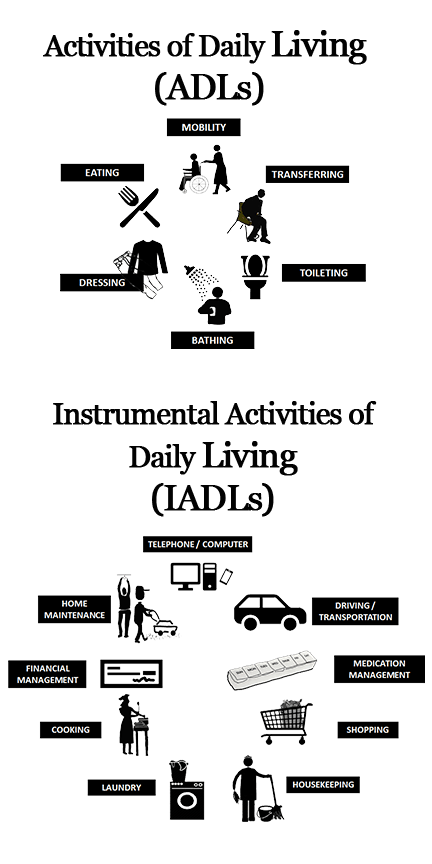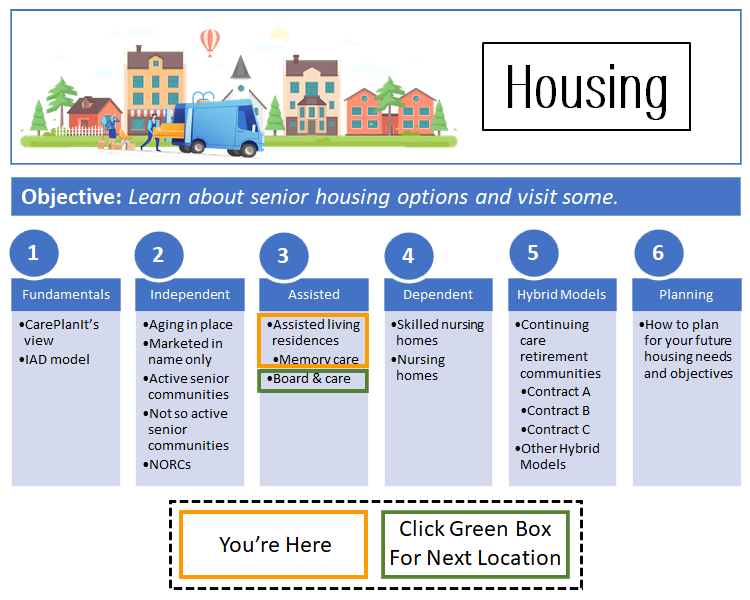Memory Care
Click here to see what's on this page.
Memory care is associated with caring for seniors with memory problems. For example, memory problems are usually associated with dementia, a complicated group of diseases including Alzheimer’s. All shades of dementia involve brain deterioration, which results in declines in cognitive and physical capabilities. We specifically discuss dementia here, and Alzheimer’s here.

Consequently, caring for a loved one with Alzheimer’s is difficult and distressing. In response, the housing industry offers memory care solutions. These solutions come in two forms: daycare solutions and longer-term housing solutions. Daycare solutions care for a senior with memory issues for a few hours during the day. Alternatively, housing solutions offer 24-7 hour solutions over long periods of time.
Quick tip:
Get a memory care contract and read it thoroughly a few weeks before you intend to sign the contract. The contract will detail what services will be provided. It will detail the housing to be provided. It will detail the liability the provider will accept. It will detail the costs for the services and the housing.
Good Memory Care In Any Environment
Luckily, you already have a general notion of what to look for in memory care. For example, it’s similar to the services you want for your young children. In other words, you want a safe environment, constant supervision, engaging activities, and a meal or two. Also, you’d like the school bus to pick them up and bring them home. If they take medication, you want the teachers or nurses at the school to provide that medication. You also want the teachers to be kind and caring. Finally, you want your child to learn things.
We’ll discuss the services and amenities of memory care facilities below, but don’t forget the above. Common sense goes a long way towards helping you make good decisions. Keep in mind that seniors are different from adults. There is a societal commitment to kids. Our societal commitment to seniors, especially those with brain diseases, is less. This means your expectations should be tempered to reality. In other words, what’s available where you live, your budget, and the cognitive, emotional, and physical capability of your loved one. Your loved one is a bit like a special needs child in this sense.
Long-Term Memory Care
CarePlanIt views all housing through the IAD model. You can review it here. In short, there are only three ways to live; independent, assisted, or dependent. Dementia makes independent living difficult. Over time seniors with dementia require assistance, and if the disease progresses, will eventually become dependent. Long-term memory care services and amenities are designed to track this progression and provide appropriate care along the way.
Good senior memory care services are designed to help the senior maintain their current capabilities while providing stimulating and enriching activities. The activities are designed to promote cognitive and physical capabilities that result in a more enriching life for the senior. In other words, good care involves stimulating what currently exists and trying to slow the decline.
Long-Term Memory Care Goals
Memory care services emerged a few decades ago as the public started to better understand Alzheimer’s. Existing assisted living facilities, and nursing homes began offering special care teams to address the specific needs of dementia patients. Some of these facilities also added special units or wings adjacent to their existing facilities to better manage dementia patients. Specifically, dementia patients have a tendency to roam and even exit facilities. Because of their disease, it’s easy for them to injure themselves or others.
Carman and I experienced this with Carmen’s mother. For example, when Nola was younger, she regularly walked ten or twenty miles a day. She was physically strong as well as strong-willed (stubborn). When she got dementia, her health didn’t immediately decline and she still loved to walk. She also often left a facility to walk home or to work. This was part of her dementia. Without a mechanism on her body alerting the facility to her whereabouts, or an enclosed dementia unit, she easily escaped the facility. Also, if she was given a roommate who would yell out, Nola would try and quiet her down, sometimes with a pillow. Nola exhibited common symptoms associated with Alzheimer’s. Consequently, she required constant supervision.
Long-Term Alzheimer’s Care Services
Quality long-term memory care units focus on ADLs, IADLs, staff, safety, and quality care. In other words, they must excel at each of these.
ADLs And IADLs
Read about ADLs and IADLs here. All memory care facilities offer support for some or all of the tasks in these categories. Your loved one with dementia must meet the requirements of the memory care unit. As a quick ADL/IADL reminder, see the diagram below. As part of the ADL/IADL evaluation is always an initial assessment to gauge the resident’s cognitive and physical status with adjustments over time.

Staff
Important staff-related issues fall into two areas. One, is there enough staff to perform the services? Two, is the staff properly trained?
Safety Related Services
Safety services involve preventing a senior from hurting themselves or others.
Quality-Related Services (Activities And Amenities)
Activities and amenities for dementia patients focus on maintaining physical and cognitive capabilities and enhancing day-to-day life. Sometimes activities are called therapies. For our purposes, we use activity and therapy interchangeably.
Memory Day Care Programs
Day programs differ from overnight programs primarily in their ability to focus care on a specific time of the day. For example, daytime-only care offers some advantages to overnight care. Also, daycare centers don’t have to obsess about medication. They can simply require the senior’s existing medication protocols to create the emotional stability they want for their center. In other words, the senior must meet the minimum required behavioral capabilities for acceptance. In addition, daycare centers require seniors who can perform most, if not all of their ADLs. Seniors need to get in and out of cars or navigate a bus with a lift.
In many cases, long-term memory care facilities offer daycare options. These centers within a center usually have more resources.
Day Care Memory Sevices And Amenities
Memory daycare is for the day. Although it doesn’t offer overnight care, it can offer many of the same services and amenities that long-term memory care offers. In fact, many long-term memory care facilities offer daycare options. The most common daycare activities and amenities are listed below.
Short Stays In Long Term Dementia Care Facilities
Some long-term memory care facilities will accommodate short stays. There are situations when a senior with memory issues checks in for a few weeks or a few months.
How To Select Alzheimer’s Care Facilities
As we mentioned earlier, the way you evaluate a school for a child involves many of the same criteria you want to use to evaluate a memory care facility. Here are our recommendations on how you can categorize and create criteria within the categories for review.
ADLs And IADLs
Staff
Also important are staff issues.
Safety
Like the staff issues above, safety is also a concern.
Quality (Amenities And Services)
Although harder to assess, quality is also a concern. Review the following:
Always Learn Admittance & Discharge Protocols
Finally, one of the most critical areas of concern is admittance and discharge. In other words, under what circumstances will my loved one be welcomed, and under what circumstance will they be kicked out?
Finding good facilities is difficult. Accordingly, knowing admission procedures is critical. For example, not knowing something may inadvertently result in your loved one being exlcuded.
Likewise, discharge procedures are equally important. For example, you don’t want your loved one discharged.
Other Resources On Memory Care
Great government site on Alzheimer’s here.
Good article on memory care here.
